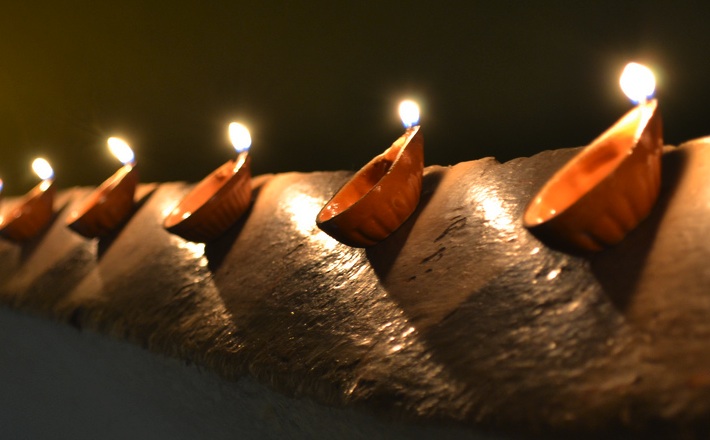Commentary on Amos 5:18-24
Today’s readings revolve around the theme of the Lord’s coming.
In both Amos 5:18-24 and Matthew 25:1-13, people expect salvation. In Amos, the Day of the Lord is to be a day of light and brightness. In Matthew, it is the highly anticipated wedding banquet, the moment when Christ returns to claim the beloved people as his bride. In both cases, there is a startling reversal of expectations.
In Amos, the people who wait for light will experience only darkness, while in Matthew some will be excluded from the wedding feast. In both cases, grace becomes judgment, and preachers must figure out how to go about the left-handed task of dismantling the gospel. While I leave it to others to consider why that must be so in the case of today’s gospel reading, I will argue that in Amos 5:18-24, the prophet must demolish false expectations so that his audience can recognize the gifts God has already given them and thereby come to participate more fully in the means of their salvation.
Amos 5:18 begins on a note of mourning. New Revised Standard Version’s “alas” translates the interjection hoy, frequently found in laments for the dead. Amos thus begins his argument by suggesting his audience is already dead. What’s killing them is their desire. So often we associate desires with temptations to idolatry, or to baser passions like lust and greed. But here the desire is for salvation of a thoroughly Yahwistic kind.
Commentators frequently point out that Amos is the first to refer to the Day of the Lord, and while it remains difficult to be exactly certain what it was, there is general agreement that the expression originated in Israel’s holy war traditions and was closely associated with the idea that God fought for Israel against its enemies. The Day of the Lord was thus a day of deliverance. Israelite faith in YHWH was rooted in YHWH’s commitment to their safety: they commemorated YHWH’s mighty works of old, and they continued to expect YHWH’s aid in the future. Their desire, then, is thoroughly orthodox, if we can use that term of ancient Israelite religion. The people eagerly await the coming of their God, the one who has saved them so many times in the past.
But Amos asks, why should you desire this day? Getting ahead of himself by saying that it will be a day of darkness, not light, he then fleshes out his concern by way of a simile drawn from his everyday pastoral experience. Amos 5:19 presents a vivid picture of a man escaping one danger, a lion, only to be met by another — a bear, and then finally reaching the safety of his house, where he is bit by a snake. We can almost see the man panting with relief as he steadies himself against the wall. But instead of reaching safety, his world goes dark. So also for the Israelites: Instead of the anticipated brightness of God’s appearing, there will be only darkness. For these people, then, there is to be no hope, no life, no gospel.
Where Amos dismantles hope in God’s future deliverance in verses 18-20, God himself speaks in verses 21-24, and it becomes clear that the relationship is already severed. In highly charged emotional language, God declares that God “hates” and “rejects” every aspect of Israelite ritual — the solemn festivals, offerings of sacrifice, even music, presumably the sounds of rejoicing and thanksgiving for Gods’ mighty acts of salvation. All of the language employed here is drawn from the priestly activity of making technical and impersonal rulings on specific instances of individual sacrifices, prayers, and offerings; here, however, the divine declaration becomes a sweeping rejection of any and all attempts to approach him.
As in verses 18-20 the ritual is not rejected because it is improper, or false, or because it is offered to other gods. The problem is the absence of justice and righteousness; and without Israel’s commitment to these things, there can be no relationship to begin with.1 God’s repudiation of Israelite ritual thus ends with a double imperative: take away the noise of your singing, but “let justice flow down like waters, and righteousness like an ever-flowing stream.”
Given its placement in the overall scheme of God’s rejection of Israel, it is difficult to know whether the waters of justice and righteousness are presented as an alternative way to approach God, or whether they are already waters of judgment. That ambiguity is the point; the waters are both. Martin Buber has drawn attention to the way in which the word pair “justice and righteousness” always refers in the pre-exilic tradition to divine activity. At the same time, he notes, the spheres of justice and righteousness are not solely God’s concern. Rather, “the divine righteousness desires to continue its operation in a human righteousness, and … man’s fate depends on whether he submits to this will or denies it.” YHWH establishes justice, and depending on the human response, it can become God’s ongoing, life-giving presence in the world, or it can pile up into a flood of destructive judgment.2
Drawing on Martin Buber’s insight that justice and righteousness are primarily a gift of God to which Israel must respond, Jörg Jeremias points out that for Amos and all the prophets, the word pair “justice and righteousness” are not “behavioral goals, but rather primarily gifts from God which Israel can allow to flourish, can support, or can obstruct, indeed (Amos 5:7; 6:12) can overthrow.”3 Amos 5 and 6 underscore the many ways in which Israel has already rejected God’s gift of justice — has hated it, in fact (5:10), thereby turning its sweet benefits for the community into the bitter wormwood of judgment (5:7; 6:12). Yet the fact remains that justice and righteousness are gifts of God. While it might be tempting to say there can be no salvation without justice and righteousness, it might be more accurate to say that for Amos, justice and righteousness are Israel’s hoped-for salvation, and they have been present all along.
Notes
1. Jörg Jeremias, The Book of Amos: A Commentary, trans. Douglas W. Stott (Old Testament Library; Louisville: Westminster John Knox Press, 1998), 102-103.
2. Martin Buber, The Prophetic Faith ONew York: Collier, 1949), 100-102, esp. 102.
3. Jeremias, Amos, 104.


November 12, 2017